If you’re using or evaluating Multiplier for global hiring, you’re already on the path to international team building. But with so many new platforms offering payroll, compliance, and EOR services—it’s worth exploring other players that may be better suited for your region, team size, or budget. In this guide, we highlight the top 8 Multiplier alternatives in 2025, breaking down what they offer, how they compare, and why global companies are switching.
Table of Contents
- What does Multiplier provide?
- Why should you consider Multiplier alternatives?
- What are the best Multiplier alternatives?
- Detailed Comparison of Top 8 Multiplier Alternatives (2025)
- What are the common mistakes to avoid when choosing Multiplier alternatives?
- How to choose the best Multiplier alternative?
- Why Choose Asanify for Your Business Expansion?
- FAQs
What does Multiplier provide?
Multiplier is a global employment platform founded in 2020 that helps companies hire, pay, and manage talent across 150+ countries without setting up local entities. Known for its affordable pricing, fast onboarding, and modern UI, Multiplier is a strong choice for startups and growing teams expanding globally.
It simplifies global HR operations through a single platform, offering services such as:
- Global EOR and compliance management
- Onboarding within 72 hours
- Multi-currency payroll and tax compliance
- Contractor payments and invoicing
- ESOP and equity support
- Crypto payroll options
- Localized benefits administration
With a strong focus on speed, flexibility, and emerging markets, Multiplier offers a practical alternative to legacy global HR solutions.
Why should you consider Multiplier alternatives?
While Multiplier offers a modern platform for global hiring and payroll, our experience and client feedback indicate that some companies face challenges with feature depth, customer support, and regional flexibility. Based on verified user reviews and industry discussions, these limitations often drive businesses to explore other EOR providers with stronger compliance capabilities or more tailored support.
Reddit Reveals: Common Challenges by Multiplier Users
From online communities and real-world user reviews, several recurring concerns have surfaced about Multiplier—particularly in support responsiveness, add-on costs, and platform maturity.
Customer Service Issues
Companies relying on Multiplier for time-sensitive global onboarding have reported occasional gaps in customer support:
- Delayed Response Times: Users mention that customer support isn’t always prompt, especially during onboarding or issue escalation.
- Limited Human Interaction: The platform leans heavily on self-service, which can be frustrating for businesses needing more hands-on assistance.
Hidden Fees and Pricing Concerns
Although Multiplier promotes competitive pricing, users have noted:
- Unexpected Charges: Additional fees for services like visa processing or third-party benefits were not clearly disclosed during onboarding.
- Lack of Transparent Tiering: Some businesses found that features they assumed were included (like ESOP support or contractor add-ons) came at an extra cost.
Product and Service Limitations
While Multiplier’s UI is user-friendly, users and businesses have cited:
- Shallow Local Knowledge: In certain regions, legal or tax nuances weren’t fully addressed by the platform’s documentation or team.
- Missing Integrations: Compared to Deel or Rippling, Multiplier currently lacks native integrations with some key HRIS or accounting systems.
- No Mobile App: For teams managing payroll on the go, the absence of a mobile app has been flagged as a limitation.
This feedback suggests that while Multiplier is a fast and flexible EOR solution, companies with complex regional needs, in-depth compliance requirements, or a need for personalized advisory may benefit from evaluating more mature or regionally focused alternatives.
Note: These insights are compiled from real user reviews and community discussions to reflect commonly reported pain points among Multiplier users.

What are the best Multiplier alternatives?
Here are the top alternatives to Multiplier in 2025—each offering a unique strength such as broader global coverage, stronger advisory support, or better technical integrations.
Top 8 Multiplier Competitors & Alternatives in 2025:
1. Asanify
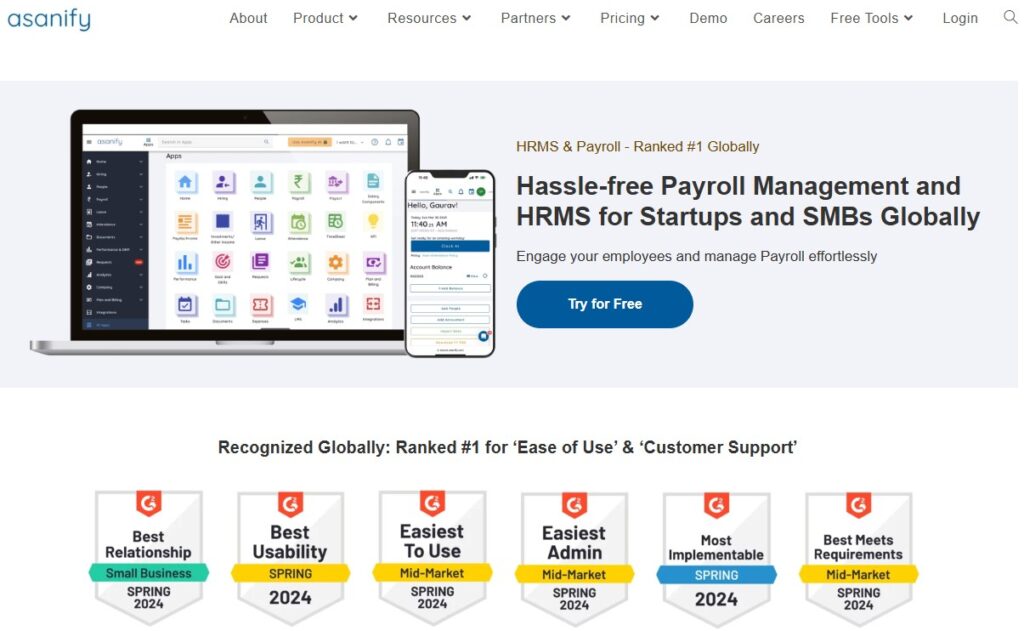
Asanify enables fast and compliant hiring across India, the UAE, Singapore, and the Philippines, with transparent pricing and in-country HR support.
An APAC-focused Employer of Record (EOR) platform designed to help global companies hire full-time employees and contractors without setting up legal entities. It simplifies onboarding, payroll, visa processing, and statutory compliance with a region-specific approach. The platform is especially well-suited for startups and SMBs looking for personalized support and quick implementation in high-compliance markets.
Key Features of Asanify:
- Localized EOR Services: Hire compliantly in India, UAE, Singapore, and the Philippines with full legal and tax coverage
- Fast Onboarding: Employees go live within 5–7 business days, including documentation and payroll setup
- Payroll Compliance: End-to-end PF, ESI, gratuity, and tax management
- Contractor Management: Multi-currency invoicing and payout support for freelancers and consultants
- Dedicated Local HR Support: Region-specific HR advisors for personalized, real-time guidance
- Visa & Immigration: Assistance with work permits and onboarding of international staff
Pricing Structure of Asanify:
- EOR Services: $299–399 per employee/month
- Contractor Management: $29–49 per contractor/month
- Setup Fees: None
Asanify’s Pros & Cons
| Pros | Cons |
|---|---|
| Transparent pricing, no hidden fees | Limited to APAC regions |
| Fast onboarding within a week | No native integrations yet |
| Strong in-country legal expertise | Smaller partner ecosystem |
| Visa and contractor support included | Less brand recognition globally |
G2 Rating: 4.8/5
2. Deel
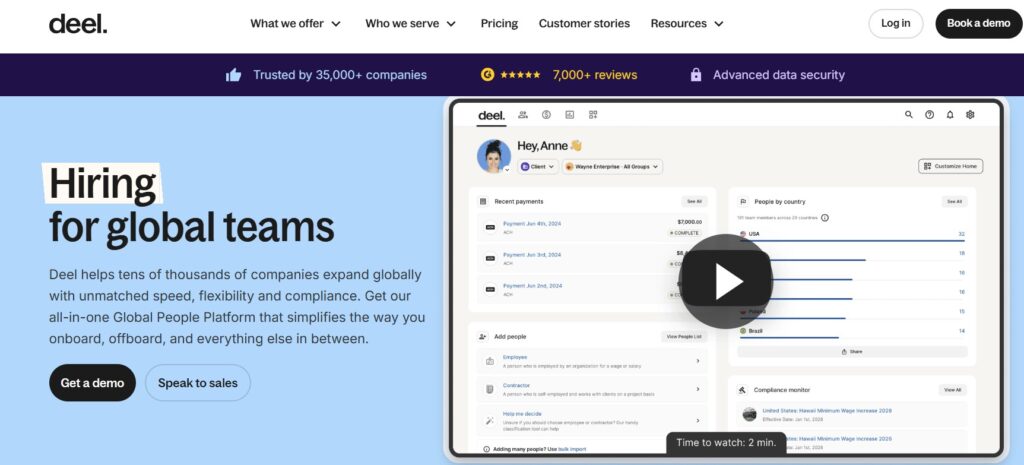
Deel streamlines international hiring through EOR, contractor management, and compliance solutions in over 100 countries. As one of the most widely adopted global payroll platforms, it supports seamless onboarding for both employees and contractors while ensuring robust legal compliance. With advanced automation and a broad range of integrations, Deel empowers distributed teams and high-growth startups to manage payroll, taxes, benefits, and equity with ease.
Key Features of Deel:
- Global EOR Services: Hire full-time employees in 100+ countries without entity setup
- Equity & IP Protection: Legal tools for IP transfer and stock option management
- Payroll & Benefits: Localized payroll with statutory benefits and insurance
- Compliance Engine: Country-specific contract templates and tax calculations
- Platform Integrations: Connects with tools like BambooHR, Netsuite, QuickBooks
Pricing Structure of Deel:
- EOR Services: From $599 per employee/month
- Contractor Management: $49 per contractor/month
- Additional services may incur extra fees
Deel’s Pros & Cons
| Pros | Cons |
|---|---|
| Strong compliance tools and legal coverage | Higher pricing than many alternatives |
| Intuitive platform with full transparency | Some advanced features are paid add-ons |
| Excellent integrations with HR and finance systems | Support wait times can vary |
| Global reach in 100+ countries | Not ideal for smaller regional expansions |
G2 Rating: 4.7/5
3. Rippling
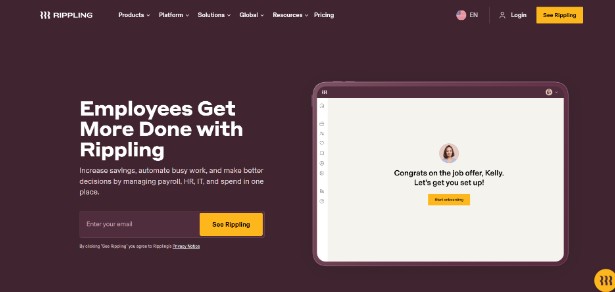
Rippling helps businesses unify their HR, IT, and finance operations on a single platform, offering global EOR support alongside automation tools.
It is a comprehensive workforce management platform that integrates HR, payroll, IT device management, and employee lifecycle operations. It supports global hiring through modular EOR services while giving companies full visibility into their remote infrastructure.
Key Features of Rippling:
- Global Payroll: Multi-country payroll support with tax compliance
- HRIS Tools: Centralized data management, onboarding, and employee workflows
- IT Management: Remote provisioning of devices and access control
- Expense & Time Tracking: Automated cost control and reporting
- Recruitment Automation: Applicant tracking and global hiring integrations
Pricing Structure of Rippling:
- EOR Services: $500–600 per employee/month
- Contractor Management: $29 per contractor/month
- HR Platform Base Fee: Starts at $8 per user/month
Rippling’s Pros & Cons
| Pros | Cons |
|---|---|
| All-in-one HR + IT + finance platform | Pricing not public; must contact sales |
| 600+ integrations and automation tools | Can be complex for small teams |
| Excellent compliance features | Advanced setup may need IT involvement |
| Global and local payroll coverage | Higher learning curve for new users |
G2 Rating: 4.6/5
4. Remote
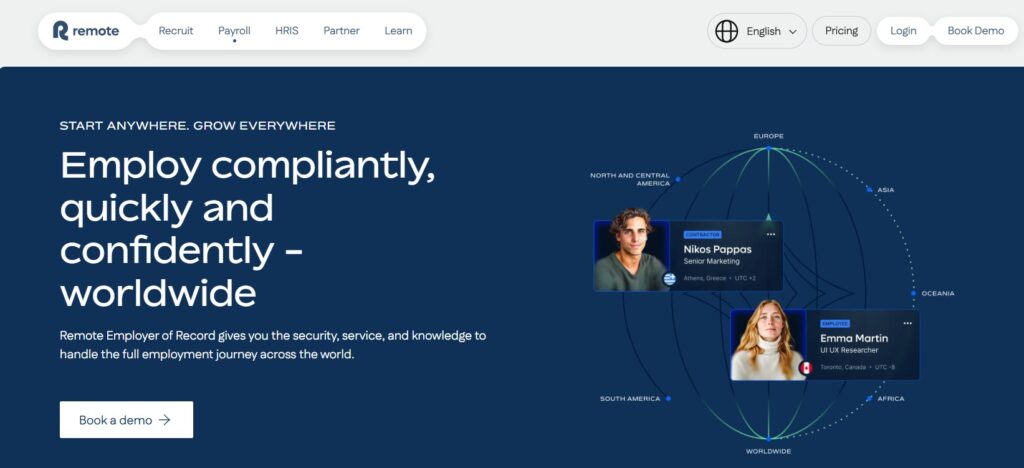
Remote provides EOR, payroll, and contractor management across 70+ countries through a self-serve platform focused on simplicity and compliance.
Remote.com is an all-in-one employment platform for globally distributed teams. It enables companies to onboard employees and contractors compliantly, manage IP and stock ownership, and provide localized benefits—all from a single dashboard with transparent pricing.
Key Features of Remote:
- Global EOR Services: Hire legally in 70+ countries without setting up local entities
- Contractor Management: Easy invoicing, payments, and tax forms in 180+ countries
- Compliance-First Approach: Country-specific legal templates and document library
- Equity Support: Built-in equity and IP transfer workflows
- Flat Pricing Model: No hidden fees for core services
Pricing Structure of Remote:
- EOR Services: Starts at $599 per employee/month
- Contractor Management: $29 per contractor/month
- Additional features available as add-ons
Remote’s Pros & Cons
| Pros | Cons |
|---|---|
| Transparent and flat-rate pricing | Some regions have slower onboarding times |
| Clean UI and documentation | Support can be inconsistent at scale |
| Built-in IP and equity protection | May lack depth in certain emerging markets |
| Integrated benefits and payroll | Not ideal for niche compliance-heavy countries |
G2 Rating: 4.6/5

5. Papaya Global
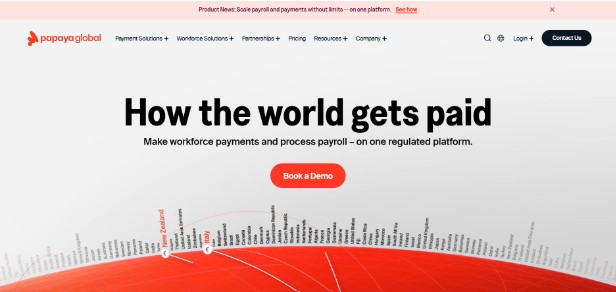
Papaya Global delivers AI-powered solutions for payroll, compliance, and workforce payments to businesses hiring in over 160 countries. Built for finance and HR teams, the platform provides in-depth visibility into global workforce costs and performance metrics. With a strong focus on automation and analytics, it supports EOR, payroll processing, and contractor management at scale.
Key Features of Papaya Global:
- AI-Driven Payroll: Real-time data processing and tax automation
- Virtual Wallet: Centralized payment gateway for multi-currency disbursements
- Compliance Management: Ensures adherence to local labor and tax laws
- Workforce Analytics: Visual dashboards for cost tracking and team insights
- Mobile Access: Employee self-service through mobile app
Pricing Structure of Papaya Global:
- EOR Services: $599–650 per employee/month
- Contractor Management: $30 per contractor/month
- Payroll+: $15–25 per employee/month
- Global Payments: From $2.50 per transaction
Papaya Global’s Pros & Cons
| Pros | Cons |
|---|---|
| AI-powered automation & analytics | Higher price point vs. competitors |
| Extensive country coverage | 12-month minimum term in contracts |
| Strong global payment infrastructure | Implementation takes time |
| Great for finance teams & reporting | Hidden fees reported by some users |
G2 Rating: 4.2/5
6. Oyster HR
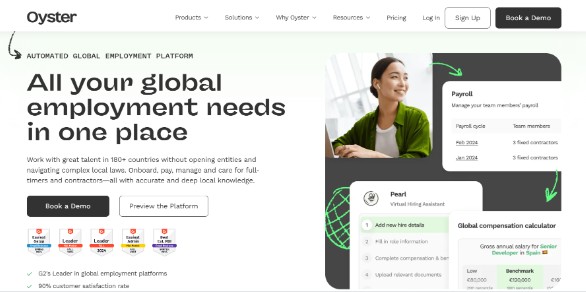
Oyster HR helps remote-first companies seamlessly hire and pay talent around the world, offering built-in tools for compliance, benefits administration, and equity management. Designed specifically for distributed teams, the platform delivers a user-friendly experience with localized benefits tailored to each country. Thanks to its automation-driven approach, onboarding employees and contractors across 180+ countries becomes a fast and scalable process.
Key Features of Oyster HR:
- EOR & Contractor Services: Hire in 180+ countries with built-in legal support
- Global Payroll & Benefits: Country-specific insurance and PTO tracking
- Multi-Currency Payments: Automated global salary disbursement
- Document Storage: Digital contracts and HR files in one place
- Built-in Leave Management: Centralized time-off tracking
Pricing Structure of Oyster HR:
- EOR Services: $599–699 per employee/month
- Contractor Management: $29 per contractor/month
- Global Payroll Add-on: $25 per employee/month
- Security Deposit: One month’s fee (refundable)
Oyster HR’s Pros & Cons
| Pros | Cons |
|---|---|
| Strong for distributed, remote-first teams | Requires upfront deposit |
| Automated onboarding and compliance | No phone or live chat support |
| Wide country coverage (180+) | Dependence on third-party partners |
| Simple UI for growing teams | Delayed payments in certain geos |
G2 Rating: 4.4/5
7. Velocity Global
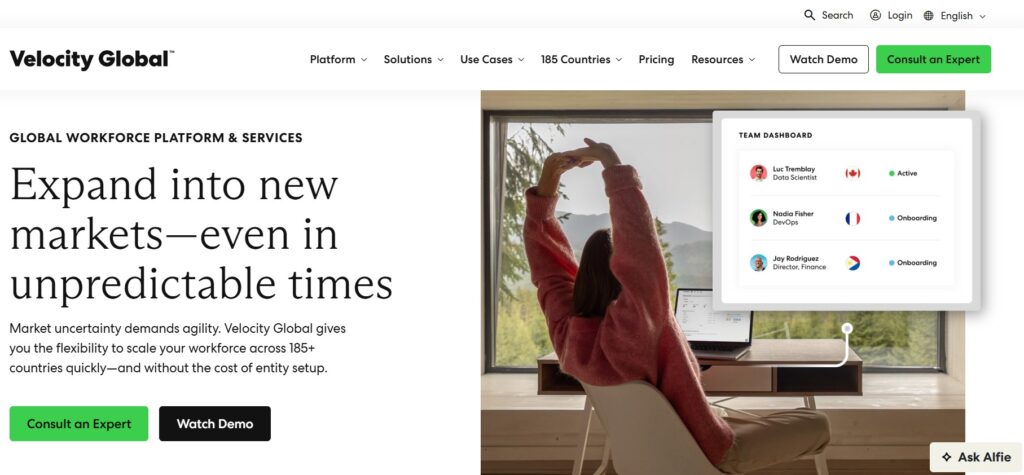
Velocity Global provides enterprise-grade hiring solutions and full legal compliance across 185+ countries through owned entities and dedicated advisors.
It is tailored for large enterprises and growing global teams that need high-touch onboarding, in-country HR support, and scalable legal coverage. With its proprietary Global Work Platform™, it supports global employment, compliance, and HR services under one roof.
Key Features of Velocity Global:
- Global EOR: Owned legal infrastructure in 50+ countries
- Enterprise Payroll: Tax-compliant payroll and benefit provisioning
- Visa & Immigration: In-house mobility support and advisory
- Dedicated HR Advisors: Country-specific onboarding specialists
- Global Work Platform™: Track hiring, payroll, and benefits in one place
Pricing Structure of Velocity Global:
- EOR Services: $600–800+/employee/month (custom pricing)
- Contractor Management: Not available
- Additional Fees: Setup, offboarding, and regional add-ons may apply
Velocity Global’s Pros & Cons
| Pros | Cons |
|---|---|
| Enterprise-ready onboarding and HR | More expensive than startup-focused tools |
| Strong compliance for visa-heavy roles | No contractor support |
| Global HR/legal expertise | Custom quotes required for pricing |
| Trusted for large-scale hiring | Slower implementation for small teams |
G2 Rating: 4.5/5
8. Globalization Partners
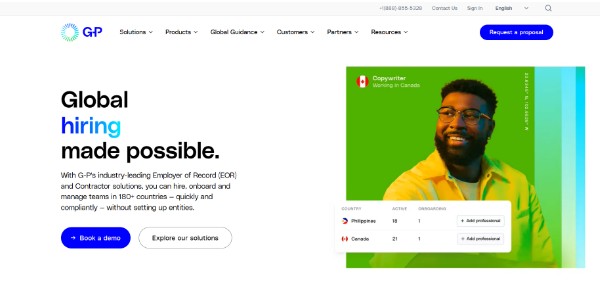
Globalization Partners enables fully compliant hiring in 180+ countries with owned entities, legal infrastructure, and comprehensive payroll services.
G-P is one of the original pioneers in the EOR space and is ideal for enterprise-level companies needing secure, scalable, and legally sound global employment infrastructure.
Key Features of Globalization Partners:
- Global Entity Network: Owned infrastructure across most major markets
- Full-Service Payroll: Localized tax and salary processing
- Immigration & Work Permits: Visa support for cross-border mobility
- Benefits Customization: Country-specific packages including insurance and leave
- Enterprise-Grade Security: SOC 2, GDPR, and ISO-compliant systems
Pricing Structure of Globalization Partners:
- EOR Services: 15% of salary (min. $1,500/month)
- Contractor Management: Not supported
- Additional Fees: Setup, offboarding, or service add-ons
Globalization Partners’ Pros & Cons
| Pros | Cons |
|---|---|
| Deepest global legal presence | Highest pricing among EORs |
| End-to-end HR and compliance support | No contractor solutions |
| Ideal for enterprise hiring at scale | Complex onboarding for SMBs |
| Owned infrastructure ensures reliability | Extra charges for regional services |
G2 Rating: 4.6/5
Detailed Comparison of Top 8 Multiplier Alternatives (2025)
To help you choose the best alternative to Multiplier, we’ve compared the top global hiring platforms based on pricing, geographic coverage, G2 ratings, and ideal use cases. This quick comparison makes it easier to identify which solution aligns best with your company’s international hiring goals in 2025.
| Platform | G2 Rating | EOR Price | Region Strength | Best For |
| Asanify | 4.8 | $299–399/month | India, APAC | Fast-growing startups |
| Deel | 4.7 | $599/month | Global | Full compliance, equity support |
| Rippling | 4.6 | $500–600/month | US, Global | IT + HR automation |
| Remote | 4.6 | $599/month | Global | Flat-fee, contractor focus |
| Papaya Global | 4.2 | $599–650/month | Global | Payroll analytics, finance teams |
| Oyster HR | 4.4 | $599–699/month | Global | Remote-native teams |
| Velocity Global | 4.5 | $600–800/month | Enterprise/global | Large-scale hiring + advisory |
| Globalization Partners | 4.6 | $1,500+/month | Global enterprise | Legal-heavy enterprise HR |
What are the common mistakes to avoid when choosing Multiplier alternatives?
As global hiring becomes more complex, we’ve seen companies make several critical mistakes when evaluating alternatives to Multiplier. Drawing from our client work and market research, these are the top pitfalls to watch out for:
Avoid lack of compliance depth, support limitations, narrow geographic focus, unclear pricing, and over-reliance on automation when choosing Multiplier alternatives.
- Neglecting deep compliance capabilities can lead to legal and tax risks, especially in high-regulation markets like India or the Middle East.
- Overlooking the quality of customer support may result in delayed onboarding, unresolved payroll issues, and frustrated employees.
- Choosing a provider with limited country coverage restricts your long-term global growth and forces platform switches as you scale.
- Falling for overly generic pricing without digging into add-ons (like benefits or visa support) may lead to budget overruns and confusion.
- Assuming automation replaces expert guidance can backfire when navigating local nuances or employment law changes.
By avoiding these common mistakes, businesses can make a smarter, more future-ready decision when switching from Multiplier—selecting a platform that truly supports international growth and long-term workforce planning.
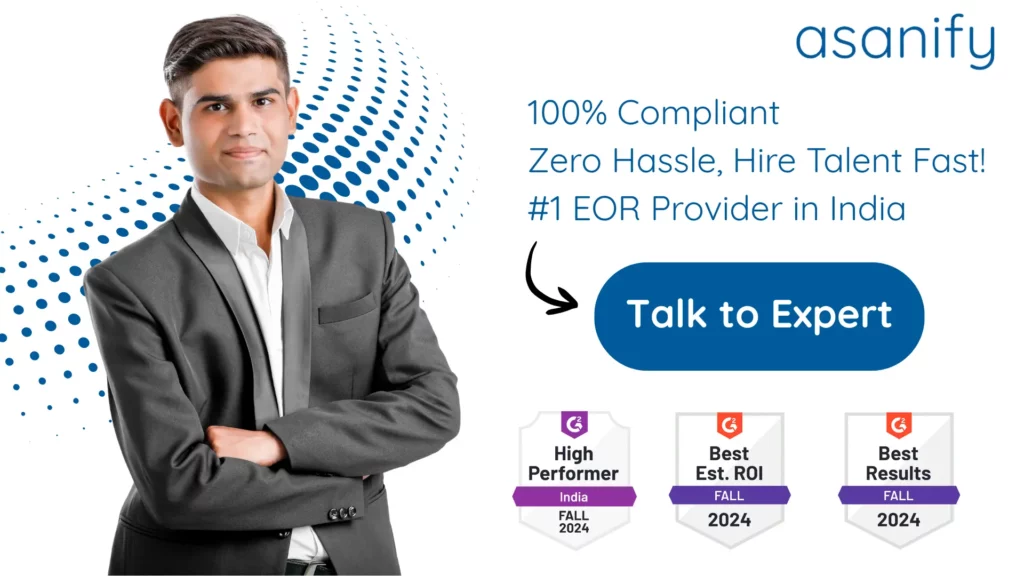
How to choose the best Multiplier alternative?
When selecting a Multiplier alternative for global hiring, it’s important to align your choice with your company’s long-term expansion and compliance needs. Based on our experience with global HR transformation, we suggest focusing on these essential criteria:
Key factors for choosing the best Multiplier alternative include regional expertise, onboarding speed, service flexibility, platform stability, transparency, and advisory support.
- Regional Expertise: Ensure the provider has deep experience in your target countries. Local knowledge of taxes, employment contracts, and statutory benefits is critical for risk-free hiring.
- Onboarding Speed: Time-to-hire can vary widely across providers. Platforms that onboard in under a week offer competitive advantages in fast-scaling environments.
- Service Flexibility: Look for platforms that handle both EOR and contractor models, support visa sponsorship, and offer customization for contracts and benefits.
- Platform Stability: Ensure the tool is reliable, secure, and integrates with your existing systems (e.g., HRIS, payroll, accounting).
- Pricing Transparency: Understand what’s included in base pricing—such as IP protection, benefits, and payroll services—to avoid unpleasant surprises.
- Dedicated Support: Seek providers offering responsive, knowledgeable customer support—not just ticket-based systems or self-serve dashboards.
Evaluating Multiplier alternatives against these benchmarks will help you select a solution that not only replaces Multiplier but also scales with your global workforce strategy.
Why Choose Asanify for Your Business Expansion?
If you’re expanding into India, Southeast Asia, or the Middle East, Asanify is one of the most regionally specialized and reliable alternatives to Multiplier. It’s built for startups, scale-ups, and global teams that need fast, compliant, and personalized support.
Here’s why Asanify stands out in 2025:
- Fast Onboarding: Employees are onboarded in under 7 business days, including compliant contracts, payroll setup, and benefits registration.
- Full EOR + Contractor + Visa Support: Asanify supports full-time hiring, freelancer payments, and visa sponsorship across key APAC and Middle East markets.
- Local Compliance Expertise: In-country HR and legal advisors manage PF, ESI, gratuity, and income tax obligations—ensuring full statutory compliance.
- Transparent Pricing: Offers flat monthly rates with no hidden setup or legal fees, making it highly cost-effective for growing teams.
- Multilingual, Human-Led Support: Dedicated account managers provide responsive, founder-friendly assistance across time zones and languages.
With its regional depth, hands-on service, and transparent pricing, Asanify is the ideal Multiplier alternative for companies scaling globally with an APAC-first strategy.
FAQs
Asanify provides localized support and faster onboarding in India, Singapore, UAE, and nearby regions.
Deel and Oyster HR are both strong in contractor onboarding and recurring payments.
Multiplier is faster and more affordable; Remote offers more global benefits and IP protection.
Yes, it’s one of the few EORs supporting crypto and multi-currency payrolls.
Choose platforms like Asanify or Velocity Global, which provide full immigration support.
Yes, Multiplier is startup-friendly due to its transparent pricing and flexible contractor plans, but support and features may be limited compared to enterprise-grade platforms.
Asanify and Multiplier both offer onboarding in under 7 days, while some platforms like Deel and Papaya may take 1–2 weeks depending on country.
Yes, Multiplier supports ESOP administration, but it may not be as comprehensive as Deel’s global equity management tools.
Rippling is the best all-in-one platform, combining EOR, IT device management, HRIS, and payroll automation in one place.
Yes, most platforms including Asanify, Deel, and Papaya Global support smooth transition and onboarding with document migration.
Globalization Partners and Papaya Global have some of the widest country coverage, with legal infrastructure in 160–180+ regions.
Not to be considered as tax, legal, financial or HR advice. Regulations change over time so please consult a lawyer, accountant or Labour Law expert for specific guidance.



